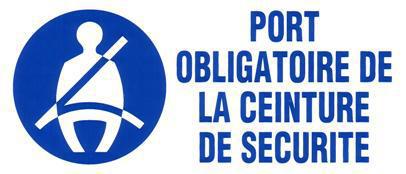Seatbelts and dogs
« previous post | next post »
I'm now at the Station Biologique de Roscoff for the Ecole thématique Big Data & Speech. On the bus from Morlaix to Roscoff, there were several copies of this sign:

However, the bus had no seatbelts installed.
This reminded me of the British cultural tradition of decorating escalators with signs reading "Dogs must be carried" ("Dogless in Albion", 9/11/2012).
But I'm not clear whether the nominalized regulation in French allows a similar conditional interpretation — could "Port Obligatoire des Chiens" mean that if you have a dog with you, you must carry it?
Jean-Sébastien Girard said,
July 9, 2018 @ 1:21 am
I believe the french would read "Les chien doivent être tenus dans les bras", which isn't ambiguous, because the obligation to hold a dog would have to be phrased with "des": "des chiens doivent […]"
[(myl) Interesting difference in use of plural definites — in English, "The dogs must be carried" could not have that interpretation.]
Hans Adler said,
July 9, 2018 @ 6:58 am
Here is my understanding of how it works in French, translated to English sentences that are as close as possible and have the same meaning. First the conditional versions:
Port obligatoire de la ceinture de sécurité. = The seatbelt must be used.
Les chiens doivent être tenus dans les bras. = Your/any dogs must be carried.
And now the unconditional versions:
Port obligatoire d'une ceinture de sécurité. = A seatbelt must be used.
Des chiens doivent être tenus dans les bras. = Dogs must be carried. [ambiguous] = It is required to carry dogs.
The distinction can be made more elegantly in French because French uses the definite article for general concepts and for implicit quantification, whereas English uses the indefinite article (or none) for the same purpose.
David Marjanović said,
July 9, 2018 @ 5:02 pm
Elsewhere, too, the use of articles is noticeably different between English, French and for that matter German, even though the English and the German ones were derived from the same demonstrative pronoun. In western Europe, articles are basically a 10th-century fashion that spread to different languages in different ways.
Y said,
July 9, 2018 @ 7:18 pm
In English, "Seatbelts must be secured" should work, and would not look too odd if none are installed.
Peter Taylor said,
July 10, 2018 @ 1:11 am
@Y, secure can also mean obtain, and in the absence of any seatbelts that might even be a more plausible interpretation than fasten.
Grop said,
July 10, 2018 @ 2:58 am
"Des chiens doivent être tenus dans les bras." sort of reads like "Some dogs must be carried."
Keith said,
July 10, 2018 @ 6:41 am
A very common sign in France is "Les chiens doivent être tenus en laisse", which in English would be "Dogs must be kept on a leash". These are just hypothetical dogs, which may or may not be present, but whenever they are present they must be kept on a leash. French wants a definite article for hypothetical dogs, English doesn't want one, as Hans pointed out for abstract nouns. It's just one of the little differences that you have to assimilate, like how some nouns are uncountable and singular in English but countable and very often used in the plural in French (such as "informations").
French has an ambiguity in the verb "porter", making the phrase "les chiens doivent être portés" seem weird for a native speaker… if I have a dog, do I need to carry it, or wear it? Which is why other posters come up with "les chiens doivent être tenus dans les bras" for "dogs must be carried".
MYL's sign indicating the requirement to wear a seatbelt that is not even present is simply an artefact of a mash-up between EU directive 2003/20/CE, French Highway Code article R. 317-24-1, the use of the bus inside a town, and the bus company's desire to comply with the rules but not waste effort determining if a bus has seatbelts or not (so just install the signs everywhere).
But Morlaix to Roscoff is 27km; a bus without seatbelts should probably not have been used on this route…
Anyway, the signs are standard, off-the-shelf items, and there is no "conditional" sign with the equivalent of "seatbelts, where present, must be worn".
Though on re-reading that statement, it could, arguably, be read to mean "only tired or abraded seatbelts are permitted".
James Wimberley said,
July 12, 2018 @ 7:48 am
The sign clearly indicates that the injunction only applies to very overweight passengers.
dainichi said,
July 12, 2018 @ 9:59 pm
Am I completely wrong that "Port obligatoire de chiens" with no article is not completely infelicitous, although possibly marked, with a meaning along the lines of "dog-carrying required"?